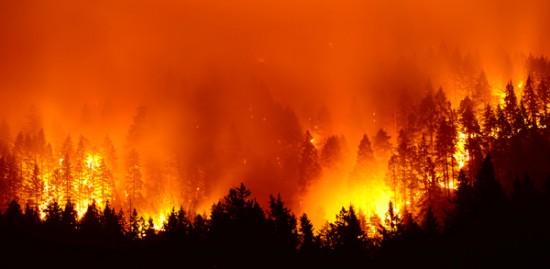|
Smoke from wildfires has a significant impact on air quality, and with heavy smoke comes health warnings. On the worst days, it can be difficult to remain outside for more than a few minutes at a time. In fact, people are advised to stay indoors when the smoke is particularly bad because of the effects that breathing it in can have on the body.
How Wildfire Smoke Can Impact Your Health
Wildfire smoke is composed of numerous suspended particles, many of which are too small to be filtered by the nose and pass directly into the lungs. Most of the particles are various forms of carbon from combusted organic matter like trees and plants, but trace amounts of heavy metals and other types of matter can be present in smoke as well.
Common symptoms of exposure to wildfire smoke include eye irritation, sore or scratchy throat, runny nose, nasal congestion, sinus irritation, headache, coughing and wheezing, and shortness of breath. The severity of the symptoms will depend on factors such as smoke concentrations and length of time exposed. Most of the time, the symptoms can be managed at home and will ease once the smoke passes.
Long-term smoke exposure, however, leaves the body in an inflammatory state for a longer period of time, increasing the potential for more serious health effects. It can trigger a long-lasting cough as well as asthma attacks and chest tightness. It can also make lung and heart problems worse.

How to Protect Yourself During Wildfire Season
When wildfire smoke drifts into your area and causes the air quality to drop, it’s important to limit your exposure as much as you can. Check the air quality reports on a regular basis and try not to spend as much time outside on particularly bad days. Keep your windows closed and run your air conditioner, but make sure that it is set to recirculate the air rather than to bring air in from outside. If you have an air cleaner with a HEPA filter, then turn it on and try to stay in the same room.
It is also recommended that you avoid any strenuous outdoor activities when the air quality is low due to smoke. Exercising causes you to breathe in as much as 10 times more air than you would at rest, which also means you are inhaling 10 times more smoke. If you are outside and you notice that you are feeling short of breath or tired, then it’s time to head indoors.
Certain people are more at risk for the negative health effects of wildfire smoke, including children, seniors, and people with lung and heart conditions. Make sure you keep an eye out for your children and older family members during periods of heavy smoke and help them limit their time outside.
By taking the right precautions, you can keep yourself and your family healthy during wildfire season. As hotter summers likely mean an increase in smoky days in the future, there’s no better time than now to learn how to prepare and stay safe.
|